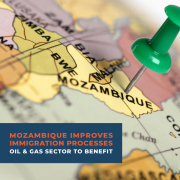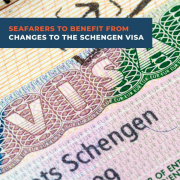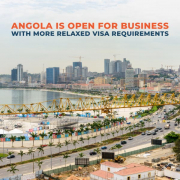NEWS | MOZAMBIQUE IMPROVES IMMIGRATION PROCESSES OIL & GAS SECTOR TO BENEFIT
/in Archived, News /by xp-adminThe expected influx of expatriates and investments into the exploration of LNG has forced government departments to implement various measures to monitor as well as facilitate entry into Mozambique. The Rovuma Basin Decree 2/2014, although approved about six years ago, its various measures and concessions for immigration-related matters were not implemented until recently. This has been timeous in the booming projects in the oil and gas sector in Pemba, Coral Sul, and others.
From an immigration perspective, this decree relaxes requirements, improves processing times, and removes layered processes.
Sub-contractors and companies in the Mozambique LNG Project are expected to benefit greatly from its measures. These companies and their approved sub-contractors, together with a plan of development approved by the Government of Mozambique, will receive access to an online portal for submissions and processing of applications. The Ministry of Labour introduced this online portal to process applications related to the Rovuma Basin and for adjudication of any expatriate skillset that is required as part of the approved projects for the region.
Overall Improvements to Mozambique’s Visa System
Since access to the online portal is exclusive to companies and sub-contractors related to the approved projects in the Rovuma Basin, all other companies must continue to follow standard processing and requirements. Quicker processing times were included in the implementation of these measures.
Short-term work permits can be expected to be processed in about 3 – 5 working days as opposed to the standard processing time of 3 – 4 weeks for companies in the non-oil gas sector. Additionally, companies, as part of their approved plan of development, receive a number of quotas allocated to them facilitating the long-term work permit process.
Long-term work permits applied through available quota positions are also processed through the online portal in shorter timeframes of approximately 5 – 7 working days. Standard processing for such applications has generally been 3 – 4 weeks.
Allowing for online processing of the applications streamlines the application for a long-term work permit avoiding additional bureaucratic tasks as part of the application process. Certain requirements such as Certificate of Equivalences issued by the Ministry of Education, similar to the South African SAQA evaluation, have been removed, which usually results in an additional 4 weeks to the end-to-end processing of long-term work permit processes.
Gateway to Residency in Mozambique
Candidates with approved work permits under the online system may qualify to obtain a residence permit upon arrival instead of previously obtaining a work visa at a Mozambican High Commission abroad and an additional residence permit at the immigration department in the province they are expecting to work. Although this may be beneficial to all expatriates arriving into Mozambique for the LNG project, it is a process exclusive to companies with an approved plan of development with the Government of Mozambique.
Overall, the changes have been timeous to the upcoming Mozambique LNG projects.
AUTHOR 
Tarissa Wareley
Immigration Specialist





